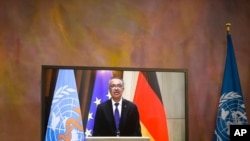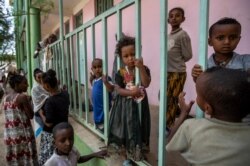Ethiopia’s conflict-hit Tigray region is facing a horrifying situation with people dying of hunger, health services destroyed and rape “rampant,” the WHO chief, himself from the region, said Monday.
“The situation in Tigray, Ethiopia, is, if I use one word, horrific. Very horrific,” World Health Organization director-general Tedros Adhanom Ghebreyesus told a press conference.
Ethiopian Prime Minister Abiy Ahmed sent troops into Tigray in November after accusing the once-dominant regional ruling party of orchestrating attacks on federal army camps.
Nobel Peace Prize winner Abiy declared victory later that month when the army entered the regional capital Mekele.
But fighting continues and the six-month conflict has sparked allegations of massacres and rape by Ethiopian forces and troops from neighboring Eritrea.
Tedros pointed out that some five million people in the region are now in need of humanitarian aid, and especially food aid.
“Many people have started dying actually because of hunger, and severe and acute malnutrition is becoming rampant,” he said.
In addition, hundreds of thousands of people have been displaced from their homes with over 60,000 fleeing into Sudan.
At the same time, health services have been looted and destroyed, he said, adding that “the majority of them are not functioning.”
Aid access key
The WHO chief also condemned indiscriminate killings and the widespread use of sexual violence in the conflict.
“Rape is rampant. I don’t think there was that scale anywhere else in the world actually,” he said.
Asked about the COVID-19 situation in his home region, Tedros said there were no services to rein in the disease, but said it is not a priority given the other crises.
“For the most part, we’re not even in a position to discuss about COVID, to be honest, because there are more pressing issues.”
One of the most urgent problems to address is getting full access for humanitarian workers and for aid.
World leaders and aid agencies have repeatedly called for full humanitarian access to the crisis-wracked areas as fears grow of impending disaster.
On Friday, the European Union condemned the ongoing blocking of aid to the region, denouncing “the use of humanitarian aid as a weapon of war.”
WHO emergencies director Michael Ryan warned Monday that “access to victims in Tigray remains highly unpredictable.”
This, he said, was creating “a huge barrier to access to the populations that need our help.”
With most health facilities destroyed, the U.N. health agency was concerned about rising risks of cholera, measles and other outbreaks, he said.
“We have also issues of continuing to get (cholera) vaccines in,” he pointed out, stressing the need to "get those doses in there" and to plan immunization campaigns “to avert a cholera disaster.”





